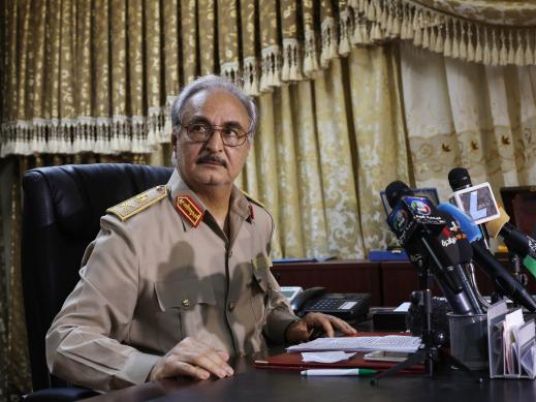
Libya's parliament on Sunday prepared to vote under heavy security to approve a new government a week after forces loyal to a renegade former general attacked the congress to demand lawmakers hand over power.
Libya's legislature is at the center of a standoff between anti-Islamist forces claiming loyalty to former general Khalifa Haftar and the pro-Islamist parties and militias he has promised to purge from the North African country.
The crisis over the parliament has deepened Libya's struggle to assert authority over the heavily armed brigades of former rebels and militias who have become the main powerbrokers three years after the fall of Muammar Qadhafi
Lawmakers were scheduled to meet in a former royal hall in Tripoli because the regular parliament building was closed following an attack by gunmen claiming loyalty to Haftar, a congress statement said.
Parliament, split between Islamist and more nationalist political blocks, are to decide whether to approve a government of new Prime Minister Ahmed Maiteeq, whose appointment was opposed by anti-Islamist militia groups.
"Congress members will hold a vote of confidence for the newly appointed prime minister …if there is a quorum of 96 members," said lawmaker Mohamed Al-Kilani.
Troops from a Tripoli brigade in armored vehicles and trucks mounted with anti-aircraft cannons guarded the white-walled royal hall and surrounding roads in the capital.
Three years after a NATO-backed revolt toppled Gaddafi, Libya still has no national army, no new constitution and its parliament is caught up in infighting.
Powerful rival brigades of former rebel fighters often make demands on the fragile state, each loosely allied with competing Islamist and anti-Islamist forces tussling for control of the OPEC oil producer.
ANTI-EXTREMIST FORCE
Haftar, a former Qadhafi ally who broke with the long-ruling leader in the 1980s and spent years in US exile, is the latest player to enter Libya's militia fray.
Last week, Haftar started what he claimed was a military campaign against Islamist militants in Benghazi in the east and also claimed responsibility for the attack on parliament.
His self-declared Libyan National Army has since called for parliament to hand over power to a commission of judges until elections later this month.
"If you attempt to meet tomorrow, you will be a considered a legitimate target for arrest," Haftar's group said late on Saturday.
Several regular army brigades have pledged their support to him. But he is opposed by powerful Islamist-leaning brigades and units of former rebels in the capital, setting the stage for a potential confrontation.
Many Libyans are fed up with parliament's political squabbling delaying a transition to democracy. In the east, Haftar gained support among Libya's tired of Islamist militants operating with impunity.
But it is not clear how much of a unifying force the former general can be or how much broad support he can garner in a country split along regional, tribal and political lines after 40 years of Gaddafi's one-man rule.
Maiteeq was named as the new prime minister two weeks ago in a chaotic vote disputed by many lawmakers. He comes from Misrata, a western city with ties to the Muslim Brotherhood – fiercely opposed for anti-Islamist militias.




